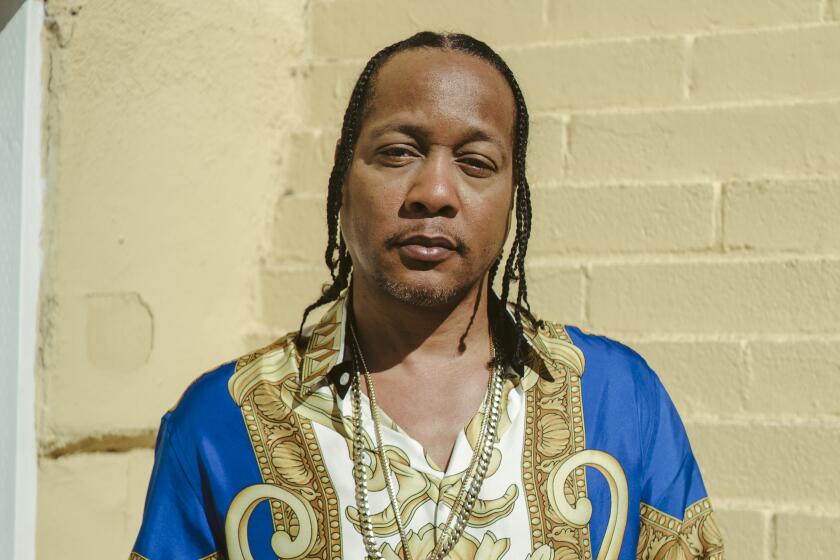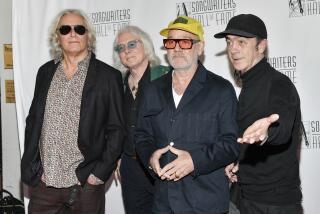After success and then struggle, R&B legends New Edition finally enjoy a victory lap
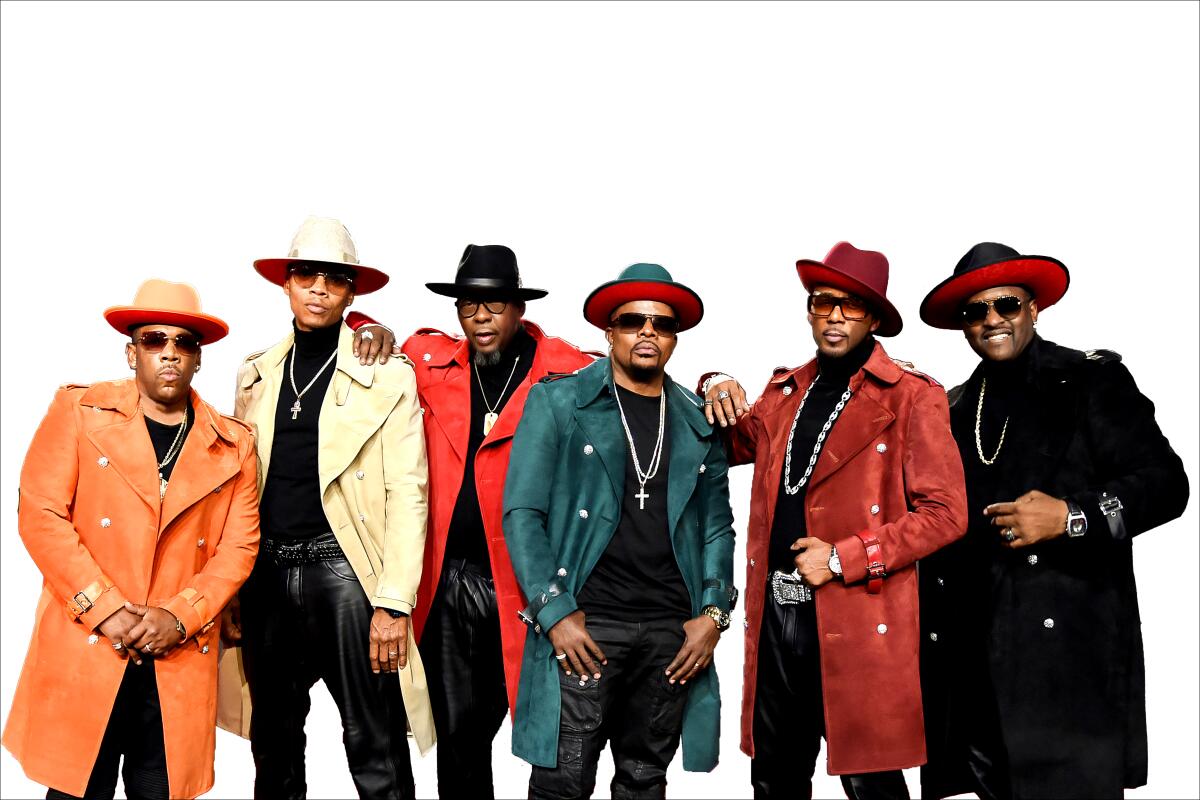
- Share via
It was 1997, and New Edition, the most gifted vocal group since the Jackson 5, was imploding.
For Ralph Tresvant, Ronnie DeVoe, Bobby Brown, Ricky Bell, Michael Bivins and Johnny Gill, the “Home Again” reunion tour was supposed to be a victory lap. Since making their 1983 debut with their wide-eyed bubblegum jam “Candy Girl,” the young singers from Boston’s tough Orchard Park projects had beaten the odds to sell over 20 million records worldwide, highlighted by their self-titled breakthrough (1984), the dramatic “All for Love” (1985) and the landmark Jimmy Jam & Terry Lewis-produced “Heart Break” (1988). (Gill, from Washington, D.C., joined the group in 1987.)
After scoring their first No. 1 album on the Billboard 200 chart with 1996’s “Home Again” and a string of solo successes, New Edition was ready for its coronation as R&B icons. Instead, the 1997 shows were a full-blown disaster.
Brown, who’d married pop superstar Whitney Houston in 1992 and whose issues with drugs and alcohol and run-ins with the law made him the subject of tabloid headlines and the butt of late-night jokes, had suffered a heart attack just two weeks before the tour kicked off. During the course of the tour, each New Edition member traveled on a separate bus. At one show in Las Cruces, New Mexico, Brown, DeVoe and their entourages got into a fight, onstage. Security teams for the two camps pulled guns on each other.
Toward the end of the tour, Tresvant had had enough. “F— it,” he told his childhood friends. “I ain’t doing no more shows.” The concerts left New Edition in debt. Gill summed up the entire experience to one interviewer: “It’s been hell, absolute hell.”

Nearly 25 years later, New Edition are in a Chicago rehearsal space, and this time around the mood is considerably lighter. The men, now in their 50s, are in high spirits, and a genuine sense of brotherhood abounds. There’s good reason: New Edition’s 30-city “Culture” tour — featuring the Gap Band’s Charlie Wilson and ’90s R&B stars Jodeci, and coming to Los Angeles’ Crypto.com Arena on Sunday — has been filling large venues with fans spanning generations and races.
The last time all six members performed together on an extended bill was in 2014. “We didn’t know if New Edition performing together was ever going to happen again,” says Tresvant, the group’s smooth-singing lead vocalist. “I believe that motivated people to come out and make sure they got the chance to see all six members out there.”
“The fans who grew up with us are really happy to come out and celebrate,” says Bell, who is also a member of New Edition’s ’90s hip-hop-fueled spinoff trio Bell Biv DeVoe.
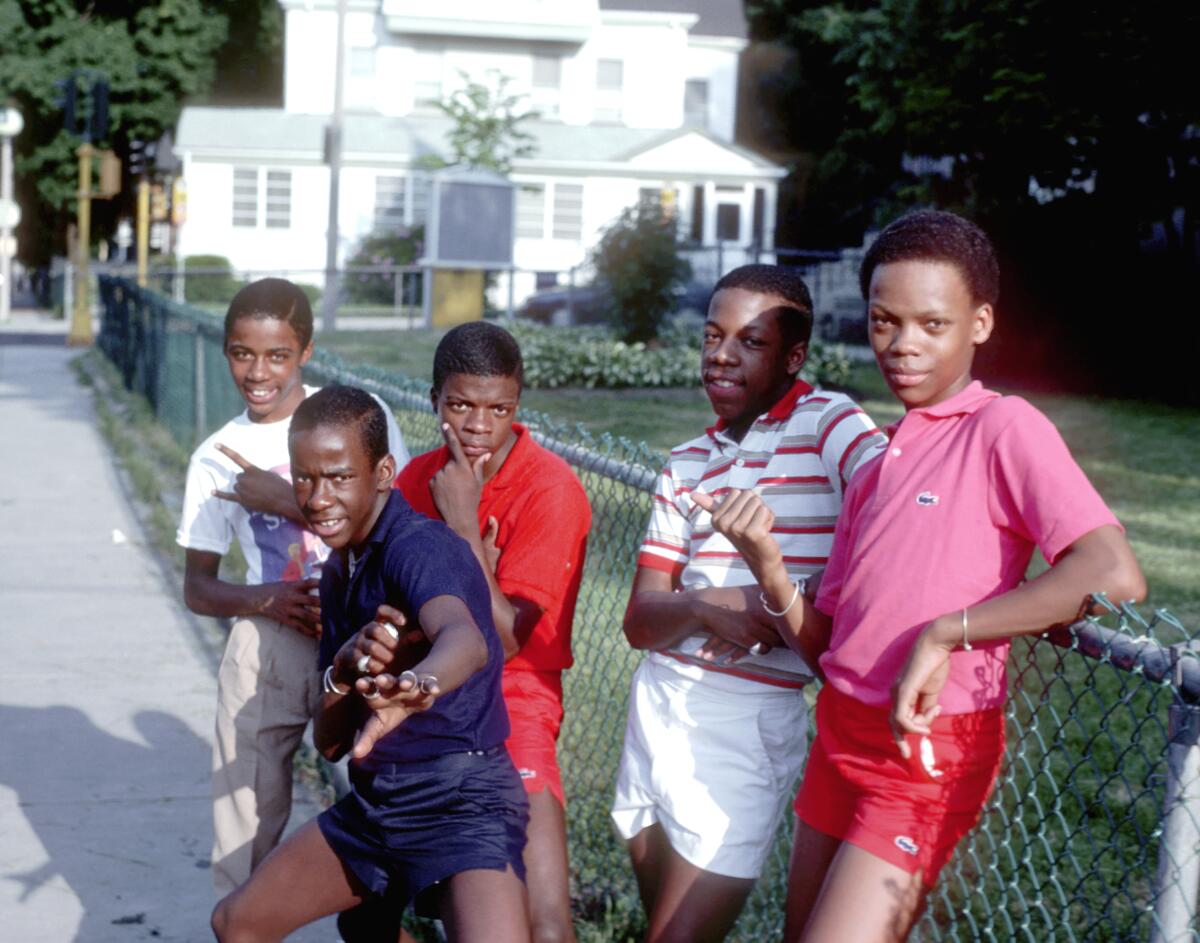
Brown, who was kicked out of New Edition in 1985 over his constant showboating and missed performances before emerging as a solo star with his 7-million-selling “Don’t Be Cruel,” is hopeful that the group’s days of infighting are behind them.
“With the ‘Home Again’ tour everybody thought they were the star,” says Brown from his Los Angeles home. “We definitely dealt with each other totally differently back then. We were a lot younger and there wasn’t a lot of [unity]. We left our egos at the door this time.”
Brown seems particularly happy to be reunited with his friends in New Edition. You could say Brown, who’s been drug free for nearly 20 years and sober from alcohol for over a year, is just happy to be alive. Between 2012 and 2020, the singer lost his ex-wife Houston, the couple’s 22-year-old daughter, Bobbi Kristina Brown, and his 28-year-old son, Bobby Brown Jr., all to drug-related deaths.
“This tour has been therapeutic for me,” says Brown. “We pray a lot. We talk a lot.”
Says Bell, who overcame his own battles with drug addiction, “To see Bobby out there doing his joints ... it’s been beautiful, man.”
Rosalía’s third LP features collaborations with the Weeknd, Pharrell Williams and Tainy, and finds her blithely mixing and matching genres and traditions.
The group — all are now married, some even with adult children — credit longtime manager, choreographer and “7th member” Brooke Payne with getting them back into fighting shape for the tour. “Oh, man, Brooke is still kicking us in the ass everyday,” laughs Brown. “Muscle memory is one thing, but being 53 years old and still trying to dance like you’re 20 is really difficult.
“We know that ticket prices are high,” he adds, “which is why it’s been so surprising to us that people are actually taking the time to pay homage to New Edition.”
Joe Hadley, the band’s booking agent at CAA, who helped sign New Edition last year to a worldwide representation deal encompassing touring, film, television, composing and literature, notes the success of the tour has caught the attention of concert promoters who traditionally lean heavily on classic rock acts as arena attractions.
“[Promoters] are starting to understand that there are [middle-age] Black music fans with disposable income,” says Hadley. “You have Black artists who are global superstars, but maybe haven’t toured in a while. There are going to be artists from different eras, like a Missy Elliott, that we will see tour again in the near future. It’s a really exciting space.”
Yet despite all the good will, New Edition has a few scores to settle. “There were times we were taken advantage of,” DeVoe says, about the group’s battles with the music industry. “Now we are making sure our budgets are right. We are paying attention to every penny that’s coming in, damn near to the concession stands. Even if we don’t have a piece of it, we are trying to understand it, because of the things that we’ve been through in our careers.”

Tresvant, Brown, Bell, DeVoe and Bivins were first discovered as kids by local songwriter and producer Maurice Starr, at a 1982 Boston-area talent show. Back then, New Edition dreamed only of following in the footsteps of their musical heroes. “We were coming after the Temptations and the Jackson 5,” recalls Tresvant. “These were the people we looked up to. In our era, the hip-hop era, New Edition was the first on the block.”
After the group returned from their first national tour, they were dropped back off at the projects with each member pocketing $1.87 apiece. Starr and New Edition’s label Streetwise Records claimed touring expenses were to blame. The boys promptly hired a lawyer and got released from their contract.
New Edition’s 1984 self-titled album for MCA Records was an even bigger success, going double platinum. They had a top five pop single, “Cool It Now.” New Edition was now a legit arena draw, selling out venues such as Madison Square Garden.
But once again, the money wasn’t adding up. New Edition soon discovered that they were not signed to MCA, but rather to their management’s production company Jump & Shoot. Each member had to borrow $100,000 from MCA to extricate themselves from yet another duplicitous deal.
“As far as New Edition is concerned, that’s never going to happen again,” insists DeVoe.
DJ Quik discusses legacy, L.A. music, Death Row records
When it came time to find a team to organize the new tour, the group went with the African American-owned company the Black Promoters Collective — which has overseen productions for H.E.R., Cardi B and Stevie Wonder — over larger conglomerates such as Live Nation and AEG Presents.
“We are uniquely positioned to work with BIPOC artists,” BPC’s co-partner Shelby Joyner said, “because we are from similar spaces and places as the talent we seek as partners.”
“For Black folks, New Edition has been at the forefront of our lives for a very long time,” says Cori Murray, deputy editor at Essence magazine. The group is scheduled to be one of the headliners at this summer’s Essence Fest at New Orleans’ Caesars Superdome.
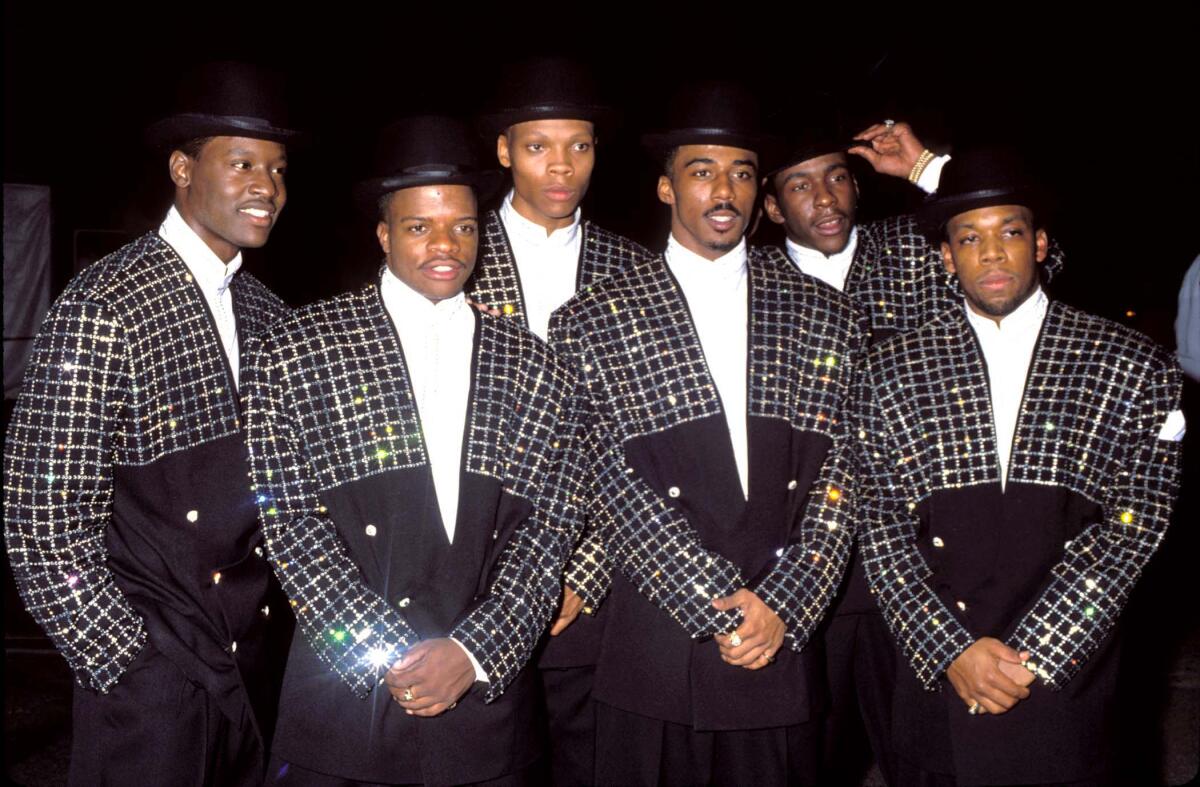
New Edition admit they haven’t always received the respect they felt due. During their success in the ’80s, a culture-shifting moment when hip-hop was just beginning to take hold of Middle America and Michael Jackson, Prince and Madonna were jockeying for pop supremacy on MTV, the teen act was often treated as an afterthought by white mainstream entertainment outlets.
“In 1983, there was no one else like us on TV or on the radio that our community could really relate to,” says Bell. “We weren’t really thinking about crossing over.”
Following Brown’s departure in late ’85, the addition of powerhouse vocalist Johnny Gill gave the group a more mature, dynamic range. New Edition’s evolution from teen-zine favorites to respected artists can be heard on “Heart Break,” now regarded as part of the new jack swing canon.
Meanwhile, New Edition became the prototype for such mammoth (white) boy bands as New Kids on the Block (also discovered and marketed by Starr), the Backstreet Boys and ‘N Sync, as well as multiplatinum R&B vocal groups such as Boyz II Men (who got their name from a New Edition song before being signed by budding music mogul Bivins), Dru Hill and Jagged Edge.
“But none of them can compete with New Edition,” Bell says in a rare moment of chest-beating. “We have the best of R&B, the best of hip-hop, the best of pop … all of that combined in one group.”

Watching New Edition perform its catalog of favorites (“Jealous Girl,” “Cool It Now,” “Mr. Telephone Man,” “Can You Stand the Rain,” “If It Isn’t Love,” “Hit Me Off”) and solo material by Brown (“My Prerogative”), Tresvant (“Sensitivity”), Bell Biv Devoe (“Poison”) and Gill (“My, My, My”) can be revelatory, a living reminder of the connection between Black ’50s doo-wop (New Edition used to cover the Penguins’ classic “Earth Angel”) and today’s airtight K-pop a la BTS.
New Edition remains the only vocal group in music history in which every member has scored a platinum or multiplatinum album. So why has it taken this long for them to capitalize on their legacy? While race has certainly played a factor, DeVoe says a big part of the blame was due to the group’s penchant for getting in their own way.
“At times we’ve played theaters [for] 4,000 fans and we had to have a support act just for that,” he admits of the act’s down period. “Some of the [issues] that we went through minimized the magnitude of what New Edition could do.”
In 2017, the group co-produced the BET scripted miniseries “The New Edition Story,” a three-part dramatization of their soap-operatic run that drew huge ratings and warm reviews. (One writer called it “the best black TV biopic” since the 1992 ABC series “The Jacksons: An American Dream.”)
Yet in 2018, the group had to scrap a much-anticipated tour over a business dispute that boiled over into public view. Tresvant and Gill reportedly trademarked the group’s name without the others’ consent. In an Instagram post, Brown cropped Tresvant out of an early ’80s throwback photo of New Edition. Tresvant responded to his ex bandmates in a 50th birthday shoutout to fans: “This year is the start of Me, Myself, and Mines… NOTHING ELSE MATTERS!!!”
Subsequently, Devoe, Brown, Bell and Biv formed RBRM (Ronnie Bobby Ricky Mike) and launched their own tour. Tresvant and Gill hit the road as a duo. “We built the name and Johnny walked into the name,” Bivins snapped on the Breakfast Club radio show.
As with most New Edition fights, the group chalks it up to miscommunication and the matter has since been resolved. “We never really talked about it,” says Tresvant. “That was the problem.”

Sometimes New Edition just needs to be reminded of their far-reaching impact. “You don’t ever really feel like you’ve made it until you look at the eyes of the guys that came up under you,” says Tresvant. “For the first time in New Edition’s career, we are finally feeling like we are in that spot.”
In addition to the current tour, New Edition is recording tracks for what they hope will be an upcoming reunion album, and there are plans for a Las Vegas residency later this year.
Meanwhile, in May, A&E will air a two-part documentary, “Biography: Bobby Brown,” that will serve as a lead-in to a 12-episode reality series, “Bobby Brown: Every Little Step.”
And if DeVoe has his way, New Edition will be in the Rock & Roll Hall of Fame in 2023, just in time for the group’s 40th anniversary. “We are definitely going to hit that home run at some point,” he says. “I’m speaking that one into existence.”
More to Read
The biggest entertainment stories
Get our big stories about Hollywood, film, television, music, arts, culture and more right in your inbox as soon as they publish.
You may occasionally receive promotional content from the Los Angeles Times.

